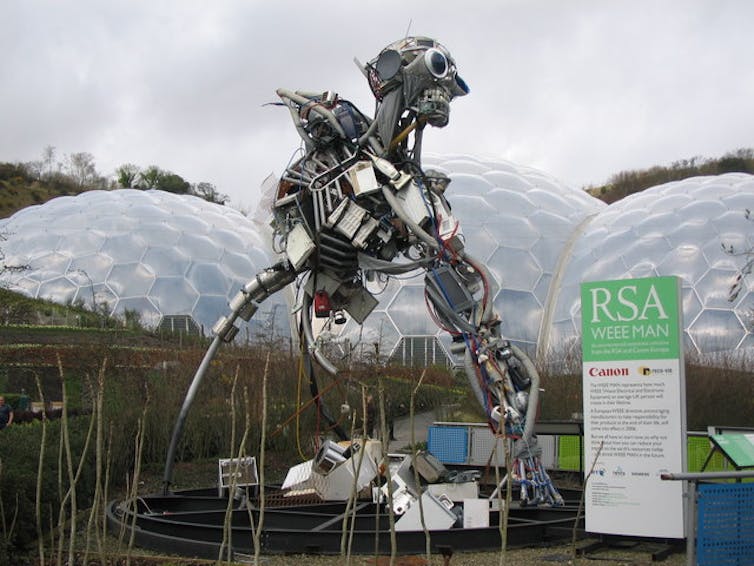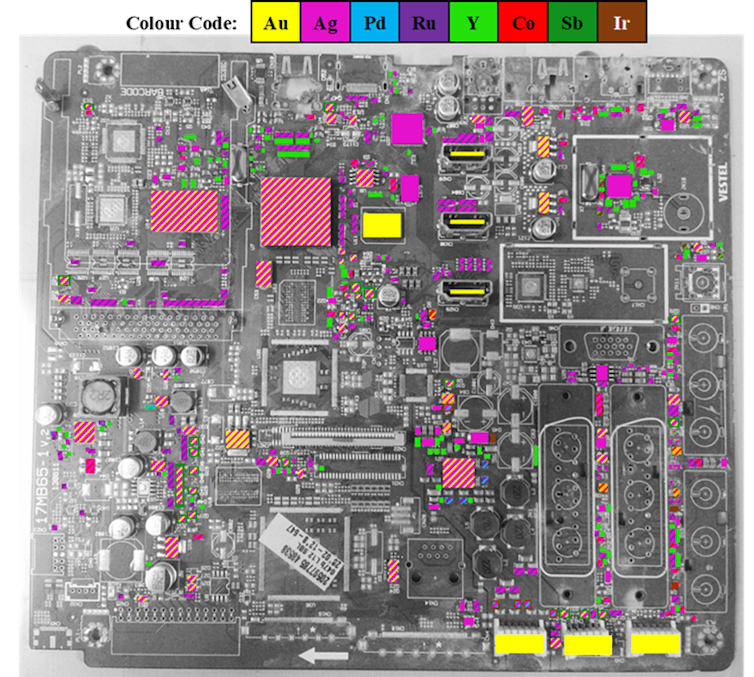Matthew Davies, Swansea University
Billions of solar panels globally will soon come to the end of their lives, but when they get thrown away, essential materials that are needed to make future panels are being wasted.
It is estimated that there will be 78 million tonnes of total waste by 2050]. This is roughly 4 billion panels. But these panels have not been designed so that we can easily extract the elements within them again to use again, so it is likely that the majority of the panels will just be shredded in recycling. This contaminates materials, making them difficult to recover.
Globally, there is a desperate need to design electronics to allow easy extraction of the materials they contain so we can reuse them in new products and avoid waste. If we don’t change the way we use materials, then we are going to limit the much-needed deployment of renewable and climate-friendly technologies for the next phase of society and to mitigate climate change. The materials we will need will be lost in the waste we have created.
Using the waste
For the solar waste mentioned above, if the materials could be efficiently recovered, they would have an estimated value of US$15 billion (£11.2 billion) and could make 2 billion new solar panels. There are more than just financial benefits – 70% of greenhouse gas emissions are linked to the extraction, manufacture and use of goods. If the world does not reduce this by digging less materials from the earth, we will not be able to tackle climate change.
It is vitally important to avoid a scenario where technologies will have to compete for materials, limiting deployment and weakening society’s ability to mitigate the climate crisis. For example, semiconductors – materials widely used in computer chips – are also needed for solar panels and low-energy lighting, the magnets needed for wind turbines are also needed for low-carbon vehicles. Already certain elements, such as indium, are being designed out of emerging solar technologies because of worries over supply.
Reuse will have benefits
Humankind has developed an insatiable appetite for the consumption of materials. In 2020, it is estimated that 100 billion tonnes of materials were extracted from the earth, with only 8.6% cycled back into the economy. As a result of this electronic waste is the fastest-growing waste stream on the planet with 53.6 million tonnes generated in 2019 globally.
A recent report by the sustainability consultancy Giraffe Innovation working with Swansea University has shown that 1.6 metric tons of electronic waste was generated in the UK in 2019. This contained an estimated 379,000kg of critical materials, with a potential value of £148 million. Due to a lack of recycling infrastructure, poor design for end-of-life and inefficiencies in the recycling processes, the majority of these critical materials contained within the waste will be lost.
These critical elements are not being efficiently recovered and recycled, meaning that this technology is inherently unsustainable at present. The global recycling rate is less than 1% for 30 critical elements that are needed for future technologies.

One major design flaw is that we tend to “glue” things together, leaving little option but to smash products into small fragments of mixed materials that are then difficult to separate. Another problem is highlighted in recent research on increasing recovery of critical raw materials from waste electronics. The figure below shows a typical circuit board and the location of the critical materials. It shows the difficulty in extracting these critical materials. Firstly, they are scattered in small amounts across the board and secondly, sophisticated equipment is needed to identify the position of these elements. This is before separation and recovery processes can even begin. Better design is key.

Design for end-of-life
Better design for end-of-life, greater processing and recycling infrastructure is needed to extract and reuse materials and to adopt of a circular economy approach. This will be beneficial for consumers, with better design of products that last longer and are easily upgradable or repairable.
For emerging technologies to be truly sustainable, it is vital that the world plans to extract critical materials when a product reaches the end of its useful life.
There is an opportunity to design emerging technologies with the circular economy in mind from the start. Waste should be thought of as be a resource, delivering maximum benefit to society and truly sustainable technologies.
Matthew Davies, Associate Professor, Swansea University
This article is republished from The Conversation under a Creative Commons license. Read the original article.












